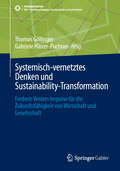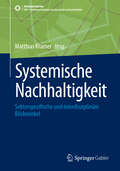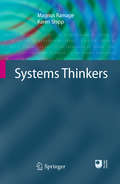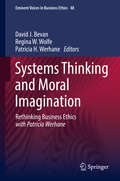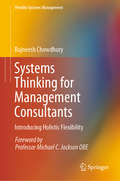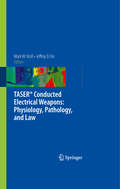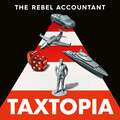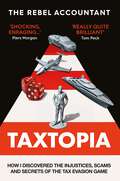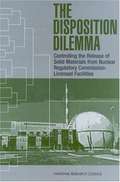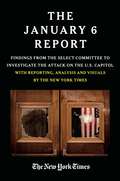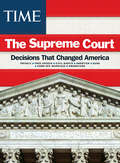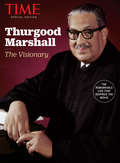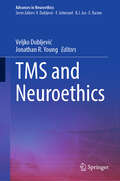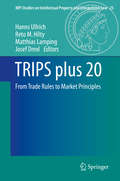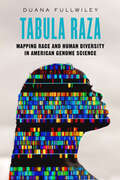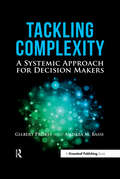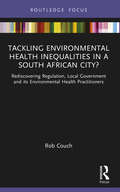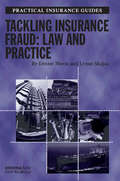- Table View
- List View
Systemisch-vernetztes Denken und Sustainability-Transformation: Frederic Vesters Impulse für die Zukunftsfähigkeit von Wirtschaft und Gesellschaft (SDG - Forschung, Konzepte, Lösungsansätze zur Nachhaltigkeit)
by Thomas Göllinger Gabriele Harrer-PuchnerDieses Buch bietet eine Darstellung von Frederic Vesters einflussreichen Arbeiten zum systemischen Denken und zur Sustainability-Transformation. Anlässlich des 100. Geburtstages dieses visionären Vordenkers versammelt der Band aktuelle Beiträge von Kolleginnen und Kollegen, Mitstreitern, Freunden und kritischen Begleitern, die dessen Einfluss auf das systemorientierte Management und die ökologische Transformation beleuchten. Sie geben eine Einführung in den Systemansatz Frederic Vesters und die Anwendung seiner Methodik, die in der heutigen Zeit der Krisen und Transformationen aktueller denn je sind. Im Mittelpunkt der insgesamt 17 Beiträge stehen zentrale Konzepte des Systemdenkens und der Nachhaltigen Entwicklung, die unter Überschriften wie „Systemdenken und konzeptionelle Sustainability-Themen&“ und „Vesters Sensitivitätsmodell – Konzepte und Tools&“ vertieft werden. Fragen zur nachhaltigen Mobilität, Stadtgesundheit, Lebensmittelproduktion, Humanökologie, Energiewende und Bioökonomie werden ebenso behandelt wie die Herausforderungen komplexer politischer Entscheidungen. Methodische Beiträge zum Vernetzten Denken, zum Sensitivitätsmodell, zu Planspielen und zu Softwaretools zeigen, wie Vesters Ansätze durch neue wissenschaftliche Erkenntnisse erweitert werden können. Das Buch richtet sich an Wissenschaftler, Praktiker und Studierende, die sich mit systemischem Denken und nachhaltiger Entwicklung befassen. Es bietet wertvolle Einblicke und praxisorientierte Beispiele, die dazu inspirieren, Vesters Methoden in ihren eigenen Arbeitsbereichen anzuwenden.
Systemische Nachhaltigkeit: Sektorspezifische und interdisziplinäre Blickwinkel (SDG - Forschung, Konzepte, Lösungsansätze zur Nachhaltigkeit)
by Matthias KramerDie Auswirkungen des Klimawandels sind längst mehr als nur ein gefühltes Phänomen. Sie zeigen sich weltweit mit zunehmender regionaler Intensität. Deutschland ist aktuell besonders von Starkregenereignissen mit Überschwemmungskatastrophen und Dürreperioden mit massiven Waldschäden betroffen. Die notwendige Reduzierung klimarelevanter Emissionen artikuliert sich u. a. in Maßnahmen zur Verkehrswende, Bau- und Infrastrukturwirtschaft, Landwirtschaft und zum Konsumentenverhalten. Zielkonflikte, wie beim Übergang vom fossilen Zeitalter zu Erneuerbaren Energien und von weniger Globalisierung zu mehr Regionalisierung, gilt es durch eine simultane Planung von Klima-, Umwelt- und Naturschutz wirtschaftswissenschaftlich orientiert zu managen. Dieser Anspruch und die Fokussierung auf mehrere SDGs im Rahmen der nachhaltigen Entwicklung stellen die fachlichen Schnittstellen zwischen den Buchbeiträgen dar. Das Buch richtet sich an Studierende, Wissenschaftler, politische Entscheidungsträger und Praktiker, die sich mit Nachhaltigkeitsthemen sowie den interdisziplinären Auswirkungen des Klimawandels befassen.
Systems Thinkers
by Karen Shipp Magnus RamageThis book presents a biographical history of the field of systems thinking, by examining the life and work of thirty of its major thinkers. It discusses each thinker's key contributions, the way this contribution was expressed in practice and the relationship between their life and ideas. This discussion is supported by an extract from the thinker's own writing, to give a flavour of their work and to give readers a sense of which thinkers are most relevant to their own interests.
Systems Thinking and Moral Imagination: Rethinking Business Ethics With Patricia Werhane (Issues in Business Ethics #48)
by Patricia H. Werhane David J. Bevan Regina W. WolfeThis volume brings together a selection of papers written by Patricia Werhane during the most recent quarter century. The book critically explicates the direction and development of Werhane’s thinking based on her erudite and eclectic sampling of orthodox philosophical theories. It starts out with an introductory chapter setting Werhane’s work in the context of the development of Business Ethics theory and practice, along with an illustrative time line. Next, it discusses possible interpretations of the papers that have been divided across a range of themes, and examines Werhane’s contribution to these thematic areas. <P><P> Patricia H. Werhane is a renowned author and innovator at the intersection of philosophy and Applied Business Ethics. She is professor emerita and a senior fellow at the Olsson Centre for Applied Ethics at Darden and was formerly the Ruffin Professor of Business Ethics. She is also professor emerita at DePaul University, where she was Wicklander Chair in Business Ethics and director of the Institute for Business and Professional Ethics. <P><P> A prolific author whose works include Moral Imagination and Management Decision-Making and Organization Ethics for Health Care, Werhane is an acclaimed authority on employee rights in the workplace, one of the leading scholars on Adam Smith and founder and former editor-in-chief of Business Ethics Quarterly, the leading journal of Business Ethics. She was a founding member and past president of the Society for Business Ethics and, in 2001, was elected to the executive committee of the Association for Practical and Professional Ethics. Before joining the Darden faculty in 1993, Werhane served on the faculty of Loyola University Chicago and was a Rockefeller Fellow at Dartmouth College and Senior Fellow at Cambridge University.
Systems Thinking for Management Consultants: Introducing Holistic Flexibility (Flexible Systems Management)
by Rajneesh ChowdhuryThis book discusses how systems thinking and approaches can aid management consultants in navigating the complexities of client advisory in current realities. It thereby brings to the forefront aspects of holism, flexibility and responsibility - the keys to success in today’s world. Management consultants are called in to offer an independent expert view of an organisation/ a situation and are expected to address some of the most pressing problems businesses face. The client does not exist in a silo, but in a complex environment that lies at the intersection of a range of internal and external factors that are often unseen and unpredictable. The organisation itself presents an alien territory that the consultant is expected to acclimatise to within a very short period of time, and come up with solutions that “insiders” would not have been able to visualise. The book presents a range of ideas, concepts and reference cases that are relevant and topical for consultants in their daily work. It argues that systems thinking allows holism and flexibility in management consulting – while holism is about the ability to encompass the environmental and organisational complexity, flexibility is about the ability to think creatively and adopt different approaches to accommodate this complexity. With commentaries, case studies, conceptual models and perspectives that cut across multiple industries, sectors and countries, this book is a valuable resource for academics and professionals alike. The book’s inner pages and its page on Springer.com contain additional comments providing perspectives of clients, industry experts and academia.
Systems of Control in International Adjudication and Arbitration: Breakdown and Repair
by W. Michael ReismanIn a world where nations are increasingly interdependent and where their problems--whether environmental, economic, or military--have a global dimension, the resolution of international disputes has become critically important. In Systems of Control in International Adjudication and Arbitration, W. Michael Reisman, one of America's foremost scholars and practitioners of international law, examines the controls that govern arbitration--a method of alternative, private, and relatively unsupervised dispute resolution--and shows how these controls have broken down.Reisman considers three major forms of international arbitration: in the International Court; under the auspices of the World Bank; and under the New York Convention of 1958. He discusses the unique structures of control in each situation as well as the stresses they have sustained. Drawing on extensive research and his own experience as a participant in the resolution of some of the disputes discussed, Reisman analyzes recent key decisions, including: Australia and New Zealand's attempt to stop France's nuclear testing in Muroroa; AMCO vs. Republic of Indonesia, concerning the construction of a large tourist hotel in Asia; and numerous others.Reisman explores the implications of the breakdown of control systems and recommends methods of repair and reconstruction for each mode of arbitration. As a crucial perspective and an invaluable guide, this work will benefit both scholars and practitioners of international dispute resolution.
TASER® Conducted Electrical Weapons: Physiology, Pathology, and Law
by Jeffrey D. Ho Mark W. KrollTASER® Conducted Electrical Weapons are rapidly replacing the club for law-enforcement control of violent subjects within many countries around the globe. A TASER CEW is a hand-held device that delivers a 400-volt pulse with a duration tuned to control the skeletal muscles without affecting the heart at a distance of up to 6.5 meters over tiny wires. If necessary, it begins with an arcing voltage of 50,000 V to penetrate thick clothing; the 50,000 V is never delivered to the body itself. Due to the widespread usage of these devices and the widespread misconceptions surrounding their operation, this book will have significant utility. This volume is written for cardiologists, emergency physicians, pathologists, law enforcement management, corrections personnel, and attorneys.
TAXTOPIA: How I Discovered the Injustices, Scams and Guilty Secrets of the Tax Evasion Game
by The Rebel Accountant'A shocking, enraging, sometimes hilarious exposé of a tax system that lives down to all our worst fears of further enriching the wealthy at the expense of the little guys.' - Piers Morgan'Very funny (and furious)... By the end of the book you may be spluttering with rage at the injustice of it all. Page after page shows how the rich are exploiting loopholes to reduce their tax bill.... But this is not some crazed figure on the extreme left hoping to bring down the establishment. The book is written by an accountant who has spent his career coming up with the very tax avoidance schemes the super-wealthy use to evade the clutches of HMRC.' - The Telegraph'Funny, clever and really quite brilliant. Taxtopia will make you furiously angry and possibly even filthy rich.' - Tom Peck, The Independent'If you want to know how skewed the system is and how the rich always get richer and stay that way, while you don't, then read this book. Then get angry.' - Patrick Alley, Co-founder of Global Witness and author of Very Bad People'Taxtopia's anonymous author has done the impossible - created a hilarious and deeply troubling expose about how the world's shady tax system is exploited and proves what we always suspected - that our tax system is rigged against us. Read it and weep.' - Geraint Anderson author of City Boy'Would I recommend the book? For readers of Spear's, my answer is 'yes, and it may also be worth going back over some of the more interesting ideas with your accountant' -Spear's'The book is enormously readable ... I would very much recommend reading Taxtopia because it's the most hilarious book about tax I've ever read!' - Siân Pattenden, The BunkerIn TAXTOPIA a rogue accountant breaks ranks to share his journey from clueless naïf to skilled tax consultant -and in doing so blows the lid on the murky world of making the tax burdens of the ultra-wealthy disappear.In the topsy-turvy world of tax avoidance, you can get richer by buying a yacht, the world's biggest exporter of coffee is Switzerland, and billionaires like Jeff Bezos, Donald Trump and the Duke of Westminster often pay less tax than you do.Written with sharp wit and over-brimming with inside secrets, the anonymous author shows us that not only does the global tax system encourage dubious practice which favours the rich, but that it was specifically founded with that in mind.If you suspect that tax is a rigged game, a con, designed to fleece the little guy, you are about to find out just how shockingly true that really is.Welcome to TAXTOPIA.
TAXTOPIA: How I Discovered the Injustices, Scams and Guilty Secrets of the Tax Evasion Game
by The Rebel Accountant'A shocking, enraging, sometimes hilarious exposé of a tax system that lives down to all our worst fears of further enriching the wealthy at the expense of the little guys.' - Piers Morgan'Very funny (and furious)... By the end of the book you may be spluttering with rage at the injustice of it all. Page after page shows how the rich are exploiting loopholes to reduce their tax bill.... But this is not some crazed figure on the extreme left hoping to bring down the establishment. The book is written by an accountant who has spent his career coming up with the very tax avoidance schemes the super-wealthy use to evade the clutches of HMRC.' - The Telegraph'Funny, clever and really quite brilliant. Taxtopia will make you furiously angry and possibly even filthy rich.' - Tom Peck, The Independent'If you want to know how skewed the system is and how the rich always get richer and stay that way, while you don't, then read this book. Then get angry.' - Patrick Alley, Co-founder of Global Witness and author of Very Bad People'Taxtopia's anonymous author has done the impossible - created a hilarious and deeply troubling expose about how the world's shady tax system is exploited and proves what we always suspected - that our tax system is rigged against us. Read it and weep.' - Geraint Anderson author of City Boy'Would I recommend the book? For readers of Spear's, my answer is 'yes, and it may also be worth going back over some of the more interesting ideas with your accountant' -Spear's'The book is enormously readable ... I would very much recommend reading Taxtopia because it's the most hilarious book about tax I've ever read!' - Siân Pattenden, The BunkerIn TAXTOPIA a rogue accountant breaks ranks to share his journey from clueless naïf to skilled tax consultant -and in doing so blows the lid on the murky world of making the tax burdens of the ultra-wealthy disappear.In the topsy-turvy world of tax avoidance, you can get richer by buying a yacht, the world's biggest exporter of coffee is Switzerland, and billionaires like Jeff Bezos, Donald Trump and the Duke of Westminster often pay less tax than you do.Written with sharp wit and over-brimming with inside secrets, the anonymous author shows us that not only does the global tax system encourage dubious practice which favours the rich, but that it was specifically founded with that in mind.If you suspect that tax is a rigged game, a con, designed to fleece the little guy, you are about to find out just how shockingly true that really is.Welcome to TAXTOPIA.
THE DISPOSITION DILEMMA: Controlling the Release of Solid Materials from Nuclear Regulatory Commission-Licensed Facilities
by Committee on Alternatives for Controlling the Release of Solid Materials from Nuclear Regulatory Commission-Licensed FacilitiesA report on Controlling the Release of Solid Materials from Nuclear Regulatory Commission-Licensed Facilities
THE JANUARY 6 REPORT: Findings from the Select Committee to Investigate the Attack on the U.S. Capitol with Reporting, Analysis and Visuals by The New York Times
by The New York Times The January 6 Select CommitteeWith exclusive reporting, eyewitness accounts and analysis from the Pulitzer Prize-winning staff of The New York Times, this edition of THE JANUARY 6 REPORT offers the definitive record of the attack on the U.S. Capitol. Read the report from the select committee&’s investigation into the Jan. 6 attack on the Capitol, with accompanying insights from New York Times reporters who&’ve covered the story from the beginning. This edition from The New York Times and Twelve Books contains: • THE JANUARY 6 REPORT from the Select Committee • Reporting and analysis from The New York Times that puts the committee&’s findings in context • A timeline of key events • Photos and illustrations, including detailed maps that show the paths insurrectionists took to breach the Capitol • Interviews, transcripts and documents that complement the Committee&’s investigation • A list of key participants from the Jan. 6 hearings A critical examination of the facts and circumstances surrounding that dark day, THE JANUARY 6 REPORT promises to be the definitive account of what happened, with recommendations from the committee about how to safeguard the future of American democracy.
THE endtimes OF human rights
by Stephen Hopgood"We are living through the endtimes of the civilizing mission. The ineffectual International Criminal Court and its disastrous first prosecutor, Luis Moreno-Ocampo, along with the failure in Syria of the Responsibility to Protect are the latest pieces of evidence not of transient misfortunes but of fatal structural defects in international humanism. Whether it is the increase in deadly attacks on aid workers, the torture and 'disappearing' of al-Qaeda suspects by American officials, the flouting of international law by states such as Sri Lanka and Sudan, or the shambles of the Khmer Rouge tribunal in Phnom Penh, the prospect of one world under secular human rights law is receding. What seemed like a dawn is in fact a sunset. The foundations of universal liberal norms and global governance are crumbling. "-from The Endtimes of Human Rights In a book that is at once passionate and provocative, Stephen Hopgood argues, against the conventional wisdom, that the idea of universal human rights has become not only ill adapted to current realities but also overambitious and unresponsive. A shift in the global balance of power away from the United States further undermines the foundations on which the global human rights regime is based. American decline exposes the contradictions, hypocrisies and weaknesses behind the attempt to enforce this regime around the world and opens the way for resurgent religious and sovereign actors to challenge human rights. Historically, Hopgood writes, universal humanist norms inspired a sense of secular religiosity among the new middle classes of a rapidly modernizing Europe. Human rights were the product of a particular worldview (Western European and Christian) and specific historical moments (humanitarianism in the nineteenth century, the aftermath of the Holocaust). They were an antidote to a troubling contradiction-the coexistence of a belief in progress with horrifying violence and growing inequality. The obsolescence of that founding purpose in the modern globalized world has, Hopgood asserts, transformed the institutions created to perform it, such as the International Committee of the Red Cross and recently the International Criminal Court, into self-perpetuating structures of intermittent power and authority that mask their lack of democratic legitimacy and systematic ineffectiveness. At their best, they provide relief in extraordinary situations of great distress; otherwise they are serving up a mixture of false hope and unaccountability sustained by human rights as a global brand. The Endtimes of Human Rights is sure to be controversial. Hopgood makes a plea for a new understanding of where hope lies for human rights, a plea that mourns the promise but rejects the reality of universalism in favor of a less predictable encounter with the diverse realities of today’s multipolar world.
THRIVE: How to Cultivate Character So Your Children Can Flourish Online
by Dr Tom HarrisonWinner of the International Federation for Family Development Award.When Dr Tom Harrison, a leading expert in the field of character education and the Internet, bought his daughter her first smartphone, a major milestone had been reached: she had entered the 'cyber-world'. Harrison no longer needed to know what to think; he needed to know what to do. This is the first practical book of its kind to show parents and teachers how to develop character as the foundation for helping young people to thrive in their online interactions. It answers the question: How do we prepare our children to do the right thing when no one is watching?Based on his own experience as a parent, more than a decade of research and thousands of conversations with parents, teachers, children and policymakers, the REACT and THRIVE models have been developed to engage with character, wellbeing, social and emotional learning, ethics and digital citizenship - all the ingredients for flourishing online.The world is waking up to the importance of character for individual and wider societal flourishing. Harrison is at the forefront of this movement and is regularly invited to advise policymakers and thousand of teachers and parents around the world. This book is a must-read for parents and educators who want to help children not just survive but thrive online in their cyber-worlds.
THRIVE: How to Cultivate Character So Your Children Can Flourish Online
by Dr Tom HarrisonWinner of the International Federation for Family Development Award.When Dr Tom Harrison, a leading expert in the field of character education and the Internet, bought his daughter her first smartphone, a major milestone had been reached: she had entered the 'cyber-world'. Harrison no longer needed to know what to think; he needed to know what to do. This is the first practical book of its kind to show parents and teachers how to develop character as the foundation for helping young people to thrive in their online interactions. It answers the question: How do we prepare our children to do the right thing when no one is watching?Based on his own experience as a parent, more than a decade of research and thousands of conversations with parents, teachers, children and policymakers, the REACT and THRIVE models have been developed to engage with character, wellbeing, social and emotional learning, ethics and digital citizenship - all the ingredients for flourishing online.The world is waking up to the importance of character for individual and wider societal flourishing. Harrison is at the forefront of this movement and is regularly invited to advise policymakers and thousand of teachers and parents around the world. This book is a must-read for parents and educators who want to help children not just survive but thrive online in their cyber-worlds.
TIME Marijuana Goes Mainstreet: A Booming Business - Your Brain on Pot - Legalization Marches On
by Bruce BarcottWelcome to the end of the war on pot. With more landmark legislation in 2016, marijuana has continued its march toward legalization and normalization, 29 states having gone medically legal. In this updated adaptation, based on Bruce Barcott's groundbreaking book Weed the People, we look at some of the key issues surrounding pot:What benefits has it shown in treating conditions ranging from glaucoma to multiple sclerosis to PTSD? How did it come to be classified as a Schedule I drug?Who are the harvesters, investors and entrepreneurs bringing pot out of the shadows and grow rooms and into the marketplace?How does such a marketplace come to exist amid a complicated regulatory framework?Where do we go from here, at a time when states are increasingly pro-legalization but a new federal administration could change things at any time?
TIME Supreme Court Decisions
by The Editors of TIMETIME Magazine examines important decisions by the Supreme Court.
TIME The Animal Mind: How They Think. How They Feel. How to Understand Them.
by The Editors of TIMEThey work with us, they play with us . . . but what do they think of us?Some of our best friends are animals. But what are they really thinking? Discover the rich inner lives of dogs, cats, whales, elephants, parrots, and dozens of other animals-even insects-with this thought-provoking book, packed with elegant animal portraits from the pages of Time magazine. From dogs that seem to sense our emotions, to cats that linger by the bedside of the dying, to apes that use sign language to express their thoughts, TIME The Animal Mind explores what really goes on in the brains of creatures great and small. The latest research and scientific evidence is here, along with a discussion of animal rights. How do dog packs work? Do animals laugh? Do they talk? Do they mourn? Do they have friends? Every animal lover will be amazed and intrigued by this insightful journey into the animal mind.
TIME Thurgood Marshall: The Visionary
by The Editors of TIMEAs an accomplished civil rights lawyer, then serving as the first African-American justice on the Supreme Court, Thurgood Marshall changed the face and course of justice in America, becoming an inspirational figure for millions. From his early days at Howard University, to his 25-year association with the NAACP, and the landmark case Brown v. Board of Education, he championed and triumphed in dozens of cases on civil liberties, affirmative action, the rights of the accused, and the death penalty. As a Supreme Court Justice, his interpretation of the Constitution led to the insurance of fair treatment for the disadvantaged in a world where judges, police, and legislatures could not be counted on to use their power fairly, and he became a voice for the voiceless. Now, in a new Special Edition from TIME, Thurgood Marshall: The Visionary, his life and legacy are examined through thoughtful essays and historic photographs. This Special Edition traces his upbringing in Baltimore, MD, his years in college and law school, his work with the NAACP, his relationship with Lyndon Johnson and more. Chapters outline the major cases that came before the Court during his tenure along with his position, and another, ÒIn Their Own Words,Ó brings together thoughtful remembrances from those who knew and worked alongside him, including Vernon Jordon, Juan Williams and Constance Baker Motley. Firmly placing Marshall in the context of his time as a visionary and examining how his social and legal legacy lives on to this day, Thurgood Marshall is a thoughtful portrait of a great American.
TMS and Neuroethics (Advances in Neuroethics)
by Veljko Dubljević Jonathan R. YoungAs transcranial magnetic stimulation (TMS) continues to expand from a tool of neuroscience research into a growing array of clinical applications, it presents a number of open questions that both invite and complicate ethical evaluation. Empirically supported concerns remain regarding interactions between TMS and psychiatric medications or other interventions, the potential for adverse effects in stimulated brain regions, and whether modulation of brain activity—particularly via changes in oscillatory states—might affect aspects of personhood. This volume explores the ethical landscape surrounding TMS in both research and clinical settings. Prior neuroethics literature has largely focused on theoretical implications of neurostimulation technologies, including conceptual clarification (e.g., invasiveness) and normative questions regarding the alignment of these technologies with societal values. However, while some empirical work has captured perspectives from TMS patients, many key voices—such as those of family members, clinicians, and underrepresented communities—have remained absent from scholarly discussions. Spanning historical reflection, theoretical debate, empirical analysis, and clinical insight, this collection features contributions from scholars and practitioners working at the intersection of neuroethics, neuroscience, psychiatry, and biomedical engineering. Part I of the volume offers historical and theoretical reflections, including the origins and growth of TMS research, racial disparities in access and participation, caregiver perspectives, and emerging issues related to cognitive enhancement, non-clinical use, and applications in social neuroscience and creativity. Part II turns to new directions and ethical issues in clinical TMS research, addressing treatment subgrouping, adolescent and geriatric use, mood and substance use disorders, suicidality, and the evolving regulatory landscape. Together, these chapters provide an interdisciplinary examination of the ethical, clinical, and societal dimensions of TMS. Whether as an introduction to the neuroethics of brain stimulation or as a resource for neuroscientists, clinicians, engineers, and ethicists, this volume aims to foster greater understanding and dialogue around the responsible development and application of TMS.
TRIPS plus 20
by Josef Drexl Reto M. Hilty Hanns Ullrich Matthias LampingThis book examines the impact and shortcomings of the TRIPS Agreement, which was signed in Marrakesh on 15 April 1994. Over the last 20 years, the framework conditions have changed fundamentally. New technologies have emerged, markets have expanded beyond national borders, some developing states have become global players, the terms of international competition have changed, and the intellectual property system faces increasing friction with public policies. The contributions to this book inquireinto whether the TRIPS Agreement should still be seen only as part of aninternational trade regulation, or whether it needs to be understood - or even reconceptualized- as a framework regulation for the international protection of intellectualproperty. The purpose, therefore, is not to define the terms of an outright revision of theTRIPS Agreement but rather to discuss the framework conditions for an interpretative evolutionthat could make the Agreement better suited to the expectations and needs of today's globaleconomy.
Tabula Raza: Mapping Race and Human Diversity in American Genome Science (Atelier: Ethnographic Inquiry in the Twenty-First Century #14)
by Duana FullwileyDuana Fullwiley has penned an intimate chronicle of laboratory life in the genomic age. She presents many of the influential scientists at the forefront of genetics who have redefined how we practice medicine and law and understand ancestry in an era of big data and waning privacy. Exceedingly relatable and human, the scientists in these pages often struggle for visibility, teeter on the tightrope of inclusion, and work tirelessly to imprint the future. As they actively imagine a more equal and just world, they often find themselves ensnared in reproducing timeworn conceits of race and racism that can seed the same health disparities they hope to resolve. Nothing dynamic can live for long as a blank slate, an innocent tabula rasa. But how the blank slate of the once-raceless human genome became one of racial differences, in various forms of what Fullwiley calls the tabula raza, has a very specific and familiar history—one that has cycled through the ages in unexpected ways.
Tabú
by Ferdinand von SchirachVon Schirach vuelve a desplegar su mirada penetrante y sensible a las turbulencias internas del ser humano y su preocupación por las grandes cuestiones éticas de nuestro tiempo. En esta novela Von Schirach replantea algunos de los grandes interrogantes de siempre: la validez del sistema de justicia en casos excepcionales, con la consiguiente justificación de transgredir o no la ley vigente. Nacido en una familia aristocrática venida a menos, Sebastian von Eschburg es un niño solitario e introvertido, con una madre que sólo se interesa por las carreras de caballos y un padre alcoholizado y aficionado a la caza, a quien, no obstante, lo une un fuerte vínculo. Con el tiempo, la extraordinaria percepción del color que posee Sebastian transformará al niño sensible y vulnerable en un famoso fotógrafo, un artista internacionalmente reconocido que plasma en sus obras una tormentosa relación entre ficción y realidad, verdad e ilusión. Sin embargo, en un giro inesperado, su vida cambia por completo cuando una llamada telefónica a la policía lo convierte de la noche a la mañana en el presunto asesino de una joven desaparecida. La crítica ha dicho...«La fluida y elegante prosa de Von Schirach nos presenta a un antihéroe acusado de asesinato, que ve el mundo en colores demasiado vivos, y a su engreído abogado defensor, que lo ve todo con matices grises. De ahí resulta una desconcertante mezcla de clímax y anticlímax, de tensión y humor, de mentiras y verdades, y una novela tan singular e intrigante como su protagonista.»The Guardian «Von Schirach narra la infancia del personaje principal con las hermosas y diáfanas frases que ya convirtieron en bestsellers sus dos libros anteriores, Crímenes y Culpa, transformando los casos judiciales en una narrativa sobresaliente.»Die Welt «Un libro que desconcierta tanto como emociona.»Sonntag «Tabú es una prueba de que las obras maestras también pueden escribirse en un lenguaje sencillo y lacónico.»Dorstener Zeitung «Von Schirach es un autor extraordinario, y Tabú, una obra muy lograda. [...] Los giros son asombrosos no sólo en lo que respecta al contenido, sino también conceptualmente.»Fabelhafte Bücher «Un libro breve, enigmático y fascinante.»The Observer «El mayor logro de Von Schirach es demostrarnos que, por monstruosos que puedan parecer sus actos, el ser humano nunca deja de ser humano.»Libération
Tackling Complexity: A Systemic Approach for Decision Makers
by Gilbert Probst Andrea BassiOur socio-economic systems continue to grow and evolve. We need to acknowledge that, consequently, our decisions often fail – they are ineffective and create unexpected side effects. The speed of execution is increasing constantly and markets and systems respond almost immediately, making decision-making challenging. There is little or no room for failure.This important new book analyses real world strategy and policy challenges, addressing the interconnectedness of the markets/systems we live in. It provides a step-by-step approach using systems thinking to solve complex problems in socio-political as well as business environment. It proposes a technique with which to better understand the problems and the context in which they arise, and tools to directly inform each step of the decision-making process. The book explores the main innovation that systemic thinking introduces – the emphasis on defining the problem creating system, which is made up of interacting parts, rather than prioritizing events that need immediate fixing.The case studies, examples and the approach proposed can be used to better understand reality and its complexity, and to integrate stakeholders for a better solution. Practically, it can be used to identify problems, analyse their boundaries, design interventions, forecast and measure their expected impacts, implement them and monitor and evaluate their success/failure. The book touches upon global issues related to policy making and strategic management, as well as issues related to sustainable development for both the public and private sector.
Tackling Environmental Health Inequalities in a South African City?: Rediscovering Regulation, Local Government and its Environmental Health Practitioners (Routledge Focus on Environmental Health)
by Rob CouchSouth Africa is widely recognised as a middle-income, industrialised nation, but it also ranks amongst the most unequal countries in the world in terms of its income distribution and human development. Environmental health remains a considerable public health challenge in the 21st century as Environmental Health Practitioners (EHPs) try to tackle local environmental health inequalities in the face of historically disadvantaged populations suspicious of their motives and demands that far exceed any resources available. Based on an empirical research project that explores how local government Environmental Health Practitioners regulate environmental health in one of South Africa’s largest, fastest growing and most unequal cities, Urbington, this book explores the many influences on their decision-making including the limits of the law, organisational controls, the views of EHPs themselves and their relations with businesses, communities, politicians and others. Tackling Environmental Health Inequalities in a South African City? argues that if we are to meet the environmental health challenges of the 21st century, it is in our best interests to rediscover this vital local public health workforce. This book is essential reading for students, practitioners and policymakers in environmental health and public health, as well as those interested in urban development and policy, particularly in African cities.
Tackling Insurance Fraud: Law and Practice (Practical Insurance Guides)
by Lynne Skajaa Dexter MorseInsurance fraud is a growing problem on a global scale. The ABI estimates that fraudulent insurance claims on motor and household policies alone cost insurers in excess of £1 billion every year. This book provides an analysis of the insurance industry’s response to the problem and examines fraud from legal and practical perspectives to determine how to manage and reduce fraud. Key issues covered include: fraud in the insurance and reinsurance context, a look at industry-wide initiatives and individual insurance companies’ approaches to the problem, consideration of recent legal developments and a look at how insurance fraud is tackled in other jurisdictions. Includes a chapter on marine insurance fraud.
